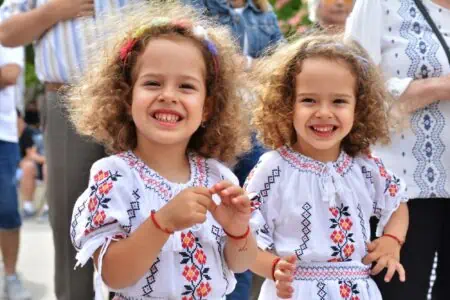From Dracula to Twilight, we’ve always been in love with the dark side, especially where vampires are concerned. Whether inspired by history, literary characters, or otherworldly forces, these names embrace the dark side with glee.
Our invigorating list of cool vampire last names will keep you entertained from start to finish. Find out the history of vampire surnames, their variations, and the most famous bearers of the names. The dark side (and Dracula himself) awaits.
100 Popular Vampire Surnames
Keep reading to find inspiration with the most intense vampire last names ahead.
Afal
Afal is also a Welsh boy’s name. The Afal surname existed in North America between 1911 and 1920, mostly in Canada in 1911. Afal may mean “apple,” but it’s just as mysterious as any other vampire last names we can find.
- Origin: Welsh, Celtic
- Meaning: Apple
- Pronunciation: AH-Fall
- Popularity: Afal is very rare worldwide and mostly used in Turkey.
Afanas
Afanas gets to the heart of vampirism with the meaning “undying.” It comes from the Greek Athanasios. Afana is used for a vampire/werewolf creature found in Romanian folklore, making it right at home here.
- Origin: Greek, African
- Meaning: Undying
- Pronunciation: Ah-FAHN-ah
- Variations: Afana
- Popularity: Afanas is extremely rare and mainly used in Russia.
Albatroz
Albatroz is extremely rare as a boy’s name and has no popularity stats as a surname. It also refers to large seabirds with webbed feet. An Albatross is anything that causes “concern” or “anxiety,” like running from a scary vampire!
- Origin: Latin
- Meaning: Seabird
- Pronunciation: AAL-bah-Tross
- Variations: Albatross
- Namesakes: Albatraoz is a Swedish electro-house musical group from Borås, Sweden.
Alnwick
Alnwick is composed of the Old English “wic,” meaning “settlement’ and the river Aln. Alnwick Castle in Northumberland, England, is the perfect spot for the vampire stories that exist there.
- Origin: English
- Meaning: Dairy farm
- Pronunciation: AHLN-wik
- Variations: Alnick, Alnwyk
- Namesakes: Jak Alnwick, an English footballer for Cardiff City. Robert Alnwick, an English MP for Scarborough, in 1393.
- Popularity: Alnwick is extremely rare worldwide and primarily used in Hong Kong.
Alvah
Alvah may be geographically pointing to the parish of Alvah in Banffshire, England. It refers to “the fair one,” the “immortal” one, and “his highness” for the top Victorian vampire.
- Origin: Hebrew
- Meaning: Exalted one, sublime
- Pronunciation: AL-vah
- Variations: Alva
- Popularity: Alvah is extremely rare worldwide and mostly used in Israel.
Ambrosia
Ambrosia also means “peace.” It’s associated with things that are “pleasing to taste or smell.” In ancient Greece, Ambrosia was the “food of the gods,” which is scarier than the Ambrosia Jello from the 1970s.
- Origin: Greek
- Meaning: Immortal
- Pronunciation: Am-BROW-siy-Ah
- Variations: Ambrosio
- Popularity: Ambrosia is very rare worldwide and mainly used in the U.S.
Ardelean
Ardelean refers to someone from the Romanian region of Ardeal. It’s known to us as Transylvania, the home of Dracula. Ardelean could also be based on the Hungarian “erdő,” meaning “forest,” but probably a Transylvanian forest.
- Origin: Romanian
- Meaning: From Transylvania
- Pronunciation: Ahr-DEE-ley-On
- Variations: Ardeal
- Namesakes: Virgil Ardelean, a Romanian police chief and head of Direcţia Generală de Informaţii şi Protecţie Internă between 1998 and 2007.
- Popularity: Ardelean is rare worldwide and primarily used in Romania, where it ranked 110th in 2014.
Athan
Athan has likely been shortened from the Greek first name Athanasios. It means “eternal life” or “immortal” and is growing in popularity as a first name for Greek boys who love vampire surnames.
- Origin: Greek
- Meaning: Immortal
- Pronunciation: AH-Thahn
- Variations: Athanas
- Popularity: Athan is rare worldwide and mostly used in Thailand, ranking 426th in 2014.
Athanasia
Athanasia also means “eternal life” and can be shortened to Athan. Athanasias are yellow flowers in the daisy family found in Southern Africa.
- Origin: Greek
- Meaning: Immortality
- Pronunciation: Ah-THAA-nah-SIY-Ah
- Variations: Athnasious, Athanase
- Namesakes: Saint Athanasia of Aegina, a 9th-century Byzantine saint and once an advisor to the Empress Theodora II.
- Popularity: Athanasia is extremely rare worldwide and mainly used in Greece.
Avici
In Buddhism, Avici refers to the “lowest level of hell” one enters before being reborn. It also means “interminable,” which could refer to the endless life of a vampire.
- Origin: Sanskrit
- Meaning: Incessant
- Pronunciation: Ah-VEE-chee
- Variations: Avicii, Avichi
- Popularity: Avici is extremely rare worldwide, with only one known occurrence in 2014 in the U.S.
Bathory
Bathory was used for a person from Bátor, a village in Hungary. It also means “hero” in Turkish and is found in Poland and Slovakia. Elizabeth Bathory was a Hungarian noble who bathed in the blood of her victims to avoid growing old.
- Origin: Hungarian, Slavic
- Meaning: Brave, valiant
- Pronunciation: BATH-ow-Riy
- Variations: Bathar
- Namesakes: Countess Elizabeth Báthory, a Hungarian noblewoman known for the murder of multiple girls and women. Dennis Báthory-Kitsz, a Hungarian-American composer with 28 ASCAP Awards.
- Popularity: Bathory is very rare worldwide and mostly used in the U.S.
Bella
Bella was used as a diminutive of Isabella and any female names ending with “-bella.” Bella is best known as the main character in the Twilight series for handsome vampires and gothic romance.
- Origin: Italian
- Meaning: Beautiful
- Pronunciation: BEHL-ah
- Variations: Bello
- Namesakes: Marcella Bella, an Italian pop singer who performed in the Festival di Sanremo in 1972. Ahmed Ben Bella, the first president of Algeria from 1963 to 1965.
- Popularity: Bella is rare worldwide, primarily used in Morocco, and ranked 317th in Burundi in 2014.
Black
Black derives from the Old English “blæc.” It was one of the nicknames used for a dark-haired male. Black is one of the simplest yet most literal vampire family names.
- Origin: Gaelic
- Meaning: Black
- Pronunciation: BLAAK
- Variations: Blacke
- Namesakes: Jack Black, an American actor given a star on Hollywood’s Walk of Fame in 2018. Frank Black, the 32nd Governor of New York from 1897 to 1898.
- Popularity: Black ranked 1,739th worldwide, is mostly used in England and ranked 174th in the U.S. in 2010.
Blade
Blade traces back to a Yorkshire family who lived in an area called Blades. It was also an occupational name for a cutler. Blade is also a fictional character in a Marvel Comics tale of a vampire hunter.
- Origin: English
- Meaning: Knife
- Pronunciation: BLEYD
- Variations: Blaede, Blaide, Blayde
- Namesakes: Richard Blade (born Richard Sheppard), a British-American radio host for SiriusXM’s 1st Wave classic alternative station since 2005.
- Popularity: Blade is very rare worldwide and mainly used in the U.S.
Blagojević
Blagojević is based on several Slavic first names using the root “blag,” like Blagoje. The most famous was Petar Blagojević, an 18th-century Serbian peasant who supposedly became a vampire after death and murdered nine villagers. Don’t mess with this or any Blagojević you meet.
- Origin: Serbian, Slavic
- Meaning: Gentle, good
- Pronunciation: Blaa-GOW-yeh-Vich
- Variations: Blagojevich, Blagoyevich
- Namesakes: Ljiljana Blagojević, a Serbian actress appearing in Lucio Fulci’s Aenigma. Slavko Blagojević, a Croatian footballer for NK Istra 1961.
- Popularity: Blagojević is rare worldwide, primarily used in Serbia, and ranked 49th in Bosnia and Herzegovina in 2014.
Brandeis
Brandeis also means “dweller on a burned clearing” and “one who came from Brandeis.” It was the name of a total of three places in Bohemia. Brandeis may refer to the Czech town called Brandýs on the Elbe River.
- Origin: German, Czech
- Meaning: From Brandeis
- Pronunciation: BRAN-dahys
- Variations: Brandes, Brandys, Brandiss
- Namesakes: Antonietta Brandeis, a Czech-Italian painter of landscapes, portraits, and religious subjects. Louis Brandeis, an associate justice on the Supreme Court of the U.S. from 1916 to 1939.
- Popularity: Brandeis is very rare worldwide and primarily used in the U.S.
Callidora
Callidora appears on most name lists as a girl’s name, meaning “gift of beauty.” It’s also the name of a family of wasps, but “beauty with a voice of gold” sounds more enticing.
- Origin: Greek
- Meaning: Beauty’s gift
- Pronunciation: Kael-iy-DOHR-ah
- Variations: Calidora, Callidorah, Callidorra, Callydora
Constantia
Constantia also means “perseverance” and “harmony.” Its literal meanings include “constancy,” especially as an Italian girl’s name. Constantia is a good idea when achieving immortality.
- Origin: Greek, Italian
- Meaning: Constant, steadfast
- Pronunciation: Kaan-STAEN-tiy-Ah
- Variations: Constantina
- Namesakes: Flavia Julia Constantia, the 4th-century daughter of the Roman Emperor Constantius Chlorus, who converted to Christianity.
- Popularity: Constantia is extremely rare worldwide and mostly used in Indonesia.
Count
Count is an official title of nobility based on the French “counte” and Latin “comitem.” It’s similar to the English Earl, but is the most famous of vampiric last names for counts named Dracula.
- Origin: English, French
- Meaning: Nobleman
- Pronunciation: KOWNT
- Popularity: Count is very rare worldwide and mainly used in the U.S.
Crimson
Crimson is the blue-red color taken from the dye called Kermes vermilio. It’s the best surname to illustrate the color of blood vampires love.
- Origin: English
- Meaning: Rich, deep red
- Pronunciation: KRIHM-Zuwn
- Variations: Crimsen, Crimsun, Crymson, Crymsun
- Popularity: Crimson is extremely rare worldwide and primarily used in the U.S.
Cruorem
Cruorem has no popularity stats and is the most unknown of vampire last names. It’s based on the Latin “cruor,” meaning “bloodshed” and “gore.” Cruorem has the same meaning in Sanskrit and Greek, so it’s not just for D&D-playing fans.
- Origin: Latin
- Meaning: Blood
- Pronunciation: Crew-OHR-um
Dagger
Dagger was first used in Cumberland at Dacre. It appeared as Dacor, based on the Dacre Beck stream, a Celtic river name meaning “the tricking one.” Dagger sounds like a vampire who hunts and a vampire hunter at the same time.
- Origin: English, French
- Meaning: Knife
- Pronunciation: DAEG-ehr
- Popularity: Dagger is very rare and mostly used in England.
Damian
Damian also means “to subdue.” It’s based on the Greek Damianos, meaning “master” and “overcome.” We may know Damian most as an evil first name, but it’s still prevalent as a surname in Romania today.
- Origin: Greek
- Meaning: To tame
- Pronunciation: DEY-miy-Ahn
- Variations: Damianos
- Namesakes: Georgeta Damian, a Romanian rower and the winner of five Olympic gold medals. Jean-Michel Damian, a French radio host on France Musique from 1980 to 2009.
- Popularity: Damian is uncommon worldwide, mainly used in Mexico, and ranked 127th in Romania in 2014.
Damon
Damon was a patronymic “D” surname meaning “the son of Dymond’.” It’s also the Greek male name Damōn, based on “damazein,” meaning “to overpower” and “to conquer.”
- Origin: English, Greek
- Meaning: Tame
- Pronunciation: DEY-Mahn
- Variations: Daimon, Daymon
- Namesakes: Cathryn Damon, an American actress known for the 1970s sitcom Soap. Matt Damon, an American actor known for Good Will Hunting.
- Popularity: Damon is rare worldwide, primarily used in the U.S., and ranked 1,302nd in South Africa in 2014.
Daedalus
Daedalus also means “skilfully wrought.” In Greek mythology, Daedalus was an inventor who created feather wings for his son Icarus.
- Origin: Latin, Irish
- Meaning: Craftsman
- Pronunciation: DEHD-ah-Lahs
- Variations: Deadelus, Dedalus
- Namesakes: Alfred Darlington (known as Daedelus), an American record producer and member of The Long Lost group.
- Popularity: Daedalus is extremely rare worldwide, with only 19 known occurrences in 2014.
Desikan
Desikan also means “Lord Krishna” in Hindi. It’s barely used, even in India, but it also exists as Desican, a boy’s name.
- Origin: Indian
- Meaning: National boy
- Pronunciation: DEH-sih-Kuhn
- Variations: Desican
- Namesakes: Rahul Desikan, an Indian-American neuroscientist dedicated to studying Alzheimer’s disease. Vedanta Desikan, an Indian philosopher with an official postage stamp released in 2019.
- Popularity: Desikan is very rare worldwide and mainly used in India.
Diablo
Diablo is the Spanish word for “the devil,” sometimes written as “El Diablo.” It’s also used in many video games, comic books, and as a Disney villain.
- Origin: Spanish, Latin
- Meaning: Devil
- Pronunciation: Diy-AHB-low
- Namesakes: Armando Gorbea (known as Tommy Diablo), a Puerto Rican wrestler and a fifteen-time WWC World Junior Heavyweight Champion. Don Schipper (known as Don Diablo), a Dutch DJ, ranked sixth in the 2020 Top 100 DJs list by DJ Mag.
- Popularity: Diablo is very rare worldwide and primarily used in Russia.
Doyle
Doyle is the Anglo spelling of the Irish Ó’Dubhghail, meaning “descendant of Dubhghall.” It’s made up of “dubh,” meaning “black,” and “gall,” meaning “stranger.” Doyle refers to “de Oilgi” in Normandy, France. Doyle also ranked 419th among U.S. surnames in 2022.
- Origin: Irish, French
- Meaning: Black stranger
- Pronunciation: DOY-Ahl
- Variations: D’Oyle, Doyley, O’Doyle
- Namesakes: Arthur Conan Doyle, a British writer who created Sherlock Holmes in 1887. Candida Doyle, an English musician and member of the band Pulp.
- Popularity: Doyle is uncommon worldwide, mostly used in the U.S., and ranked 9th in Ireland in 2014.
Dracula
Dracula is rooted in the Romanian “drac,” meaning “dragon.” It’s the most famous vampire name in Bram Stoker’s Dracula and the surname of Prince Vlad II, who inspired Dracula.
- Origin: Romanian
- Meaning: Son of Dracul
- Pronunciation: Drae-KEW-lah
- Variations: Dracul
- Popularity: Dracula is extremely rare worldwide, with only seven known occurrences in 2014, mainly in South Africa.
Drago
Drago is the Italian variation of the Latin Draco, meaning “dragon.” It’s a common male first name in South Slavic countries. Drago also comes from the Slavic “dorgu,” meaning “precious,” for a positive twist.
- Origin: Slavic, Latin
- Meaning: Dragon
- Pronunciation: DRAA-Gow
- Variations: Draga, Draco
- Namesakes: Luis Drago, an Argentine Minister of Foreign Affairs in 1902. Dick Drago, an American baseball player for the Boston Red Sox in the 1970s.
- Popularity: Drago is rare worldwide, primarily used in Italy, and ranked 327th in Malta in 2014.
Dragomir
Dragomir was the name of one of twelve royal Moroi families, whose colors are green and gold, symbolized by a dragon. Dragomir is a village in Bulgaria and in Romania where Dhampir, or half-human/half-vampires, might have been found.
- Origin: Romanian, Slavic
- Meaning: Precious peace
- Pronunciation: DRAH-gow-Mihr
- Variations: Drago, Drahomir, Drogomir
- Namesakes: Dumitru Dragomir, the Romanian Professional Football League president from 1996 until 2014. Dumitru Dragomir, a Romanian politician who voted for the Union of Bessarabia with Romania in 1918.
- Popularity: Dragomir is rare worldwide and mostly used in Romania, where it ranked 36th in 2014.
Drusilla
Drusilla is best known as a woman’s name, meaning “valiant.” It’s based on the Latin Drusus and the Celtic Drausus. Drusilla also means “dew” and is a character on the TV series Buffy the Vampire Slayer.
- Origin: Latin, Celtic
- Meaning: Courageous
- Pronunciation: Druw-SIHL-ah
- Variations: Druesilla, Druscilla, Drucilla, Drusila
- Popularity: Drusilla is extremely rare worldwide, with only ten known occurrences in 2014, mainly in Cameroon and Italy.
Edoardo
Edoardo is the Spanish equivalent to Edward, based on the Old English Eadweard, meaning “rich guardian.” It’s an ode to Edward Cullen from Twilight, Spanish style.
- Origin: Spanish
- Meaning: Wealthy guard
- Pronunciation: Ed-WAAR-dow
- Variations: Eduardo
- Popularity: Eduardo is extremely rare worldwide and primarily used in Indonesia.
Edwardson
Edwardson, inspired by Edward, is the most straightforward of vampire surnames. The Old English Eadweard means “prosperity guard.” The “son of Edward” may also be a huge Twilight fan.
- Origin: English, Welsh
- Meaning: Son of Edward
- Pronunciation: ED-ward-Sahn
- Variations: Edward, Edwards
- Namesakes: Åke Edwardson, a Swedish author and three-time winner of the Swedish Crime Writers’ Academy Award for the best crime novel. Dave Edwardson, an American musician, and member of the band Neurosis.
- Popularity: Edwardson is very rare worldwide and mostly used in the U.S.
Eleazar
Eleazar is better known as the Jewish boy’s name Elʽazar. He was a biblical priest and the nephew of Moses, whose name sounds ideal for an ancient vampire.
- Origin: Hebrew
- Meaning: God has helped
- Pronunciation: El-EY-zer
- Popularity: Eleazar is rare worldwide, mainly used in the Philippines, and ranked 1,775th in Chad in 2014.
Eli
Eli also means “lifting up” and “offering.” It comes from the Hebrew “aly,” meaning “high,” and can also mean “my God” for the vampire who wishes to repent.
- Origin: Hebrew
- Meaning: High, elevated
- Pronunciation: EE-Laey
- Variations: Eliy, Elay, Elye
- Namesakes: Billy Eli, an American singer/songwriter with an album in the Roots Music Report’s Top 100 Roots Country Albums of 2011. Roger Eli, an English footballer for Leeds United.
- Popularity: Eli is rare worldwide and primarily used in Nigeria.
Eliodoro
Eliodoro comes from the Greek Hêliódôros. It’s made up of “hḗlios,” meaning “sun,” and “dôron,” meaning “gift.” Eliodoro means “gift of the sun God Helios,” which may turn out to be a vampire’s nemesis.
- Origin: Spanish, Greek
- Meaning: Gift from the sun
- Pronunciation: Eh-LIY-ah-DOR-Oh
- Popularity: Eliodoro is extremely rare worldwide and mostly used in Brazil.
Emperor
Emperor was once a nickname for the “king.” It’s associated with the French “lempriere” and the Latin “imperator.” Emperor is made for the “sovereign ruler” of any realm, living or dead.
- Origin: French, Latin
- Meaning: Ruler
- Pronunciation: EMP-eh-ROAR
- Popularity: Emperor is extremely rare worldwide and mainly used in Nigeria.
Emrick
Emrick derives from the Old German Haimirich. It’s made up of “haimaz,” meaning “home,” and “rīkijaz,” meaning “royal.” Emrick also means “sovereign of the homeland.”
- Origin: German
- Meaning: Home ruler
- Pronunciation: EHM-rik
- Namesakes: Joseph Emrick, a member of the Pennsylvania House of Representatives since 2011. Michael Emrick, an American hockey sportscaster on NBC and NBCSN.
- Popularity: Emrick is very rare and primarily used in the U.S.
Enoch
Enoch also means “trained” and “disciplined.” In the bible, Enoch was the great-grandfather of Noah, with a world of ancient meaning behind it.
- Origin: Hebrew
- Meaning: Dedicated
- Pronunciation: IY-Nahk
- Variations: Enok, Enoc, Enock
- Namesakes: Suzanne Enoch, an American romance novel writer of The Black Duke’s Prize. Leeanne Enoch, an Australian member of the Queensland Legislative Assembly since 2015.
- Popularity: Enoch is rare worldwide, mostly used in Nigeria, and ranked 745th in Papua New Guinea in 2014.
Erasmus
Erasmus also means “the loved one” in Greek. It’s inspired by the mythological concept of Eros, or love. Erasmus also means “desired” or “beloved” for vampires with a softer side.
- Origin: Greek, Latin
- Meaning: To love
- Pronunciation: Eh-RAS-mahs
- Variations: Erazmus
- Namesakes: Georges Erasmus, the Canadian national chief of the Assembly of First Nations from 1985 to 1991. Douglas Erasmus, a South African swimmer who competed at the 2016 Summer Olympics.
- Popularity: Erasmus is rare worldwide and mainly used in South Africa, ranking 78th in 2014.
Ezdemir
Ezdemir is relatively unknown, with only one possible connection to the Turkish Ozdemir, meaning “pure iron.” It makes sense since Ezdemir is also used (although rarely) in Turkey.
- Origin: Turkish
- Meaning: Unknown
- Pronunciation: EZ-deh-Mihr
- Variations: Oezdemir
- Popularity: Ezdemir is extremely rare worldwide, with only 105 known occurrences in 2014, primarily in Turkey.
Fayez
Fayez is specifically Pakistani and means “gracious” and “favorable.” It relates to the male name Faiz, which means “winner” for your favorite vampire character.
- Origin: Arabic
- Meaning: Victorious
- Pronunciation: FEY-ehz
- Variations: Faaiz
- Namesakes: Musallem Fayez, an Emarati footballer for Al-Dhafra.
- Popularity: Fayez is rare worldwide, mostly used in Egypt, and ranked 131st in Syria in 2014.
Fino
Fino is often used as a nickname for many names ending in “-fino,” like Adolfino, Rodolfino, and Serafino. The Italian adjective “fino” means “slender,” but it also means “burning one” and “serpent” from the Hebrew Seraphim.
- Origin: Italian, Portuguese
- Meaning: Fiery one
- Pronunciation: FEE-Now
- Namesakes: Gabriel Fino Noriega, a Honduran journalist who presents a radio show on Radio Estelar. Bashkim Fino, the 29th Prime Minister of Albania from March to July 1997.
- Popularity: Fino is rare worldwide, mainly used in Italy, and ranked 745th in Portugal in 2014.
Foy
Foy means “faith” in French. It mainly comes from the Gaelic O’Fiaich, meaning “raven,” which brings the blackest bird to the family called Foy.
- Origin: Gaelic, French
- Meaning: Raven
- Pronunciation: FOIY
- Namesakes: Claire Foy, a British actress appearing in the Netflix series The Crown (2016 to 2017). Des Foy, an Irish rugby league footballer who competed in the 1995 Rugby League Emerging Nations Tournament.
- Popularity: Foy is rare worldwide, primarily used in the U.S., and ranked 592nd in Ireland in 2014.
Gaspare
Gaspare derives from the Old Persian “kaspar,” meaning “treasure bringer.” It’s the name of one of the Three Kings of the Bible bearing gifts for Jesus. Gaspare is also the first name Gaspar, once very popular in medieval times.
- Origin: Italian, Persian
- Meaning: Treasure
- Pronunciation: GAES-paer-Eh
- Variations: Gaspere, Gaspar
- Popularity: Gaspare is very rare worldwide and mostly used in Latvia, where it ranked 1,807th in 2014.
Gobara
Gobara is one of the vampire family names with unknown origins. It may be a Sanskrit and Hindi word for “excrement” or “dung.” Despite this mystery, Gobara is a badass name in its own right.
- Origin: Hindi
- Meaning: Dung
- Pronunciation: Goh-BAAR-ah
- Popularity: Gobara is rare worldwide and mainly used in Sudan, ranking 1,452nd in 2014.
Hannibal
At one time, Hannibal was the Middle English Amabil, which became the female Annabel instead of a surname. The Hebrew Baal-Hanan inspired the ancient Hannibal, meaning “gracious Baal” or “master of grace.” Hannibal King is also a character in Marvel Comics who happens to be a vampire.
- Origin: English, Latin
- Meaning: Lord
- Pronunciation: HHAEN-ih-Bahl
- Variations: Hanibal, Haniball
- Namesakes: Robin Hannibal, a Danish record producer and member of the musical duo Quadron. Steven Gillespie (known as Dr. Hannibal), a Canadian wrestler with Frontier Martial-Arts Wrestling in the 1990s.
- Popularity: Hannibal is very rare worldwide, primarily used in the U.S., and ranked 1,289th in Denmark in 2014.
Ingrumangel
Ingrumangel is obscure but uses the Norse root “ingrum,” meaning “angel-raven.” “Mangel” means “familiar one” and “visitor.” An angel-raven-visitor makes for one impressive vampiric creature.
- Origin: Norse
- Meaning: Raven
- Pronunciation: Ihn-gruw-MAAN-gel
- Variations: Ingelram
Isabella
Isabella is a Spanish and Italian version of the Hebrew Elisheba, meaning “God is my oath.” It’s more recognizable as a girl’s name than a surname. Isabella also relates to Elizabeta (or Elizabeth Bathory), the Hungarian vampire-like countess who allegedly bathed in blood.
- Origin: Italian, Spanish
- Meaning: Pledged to God
- Pronunciation: Ihz-ah-BEHL-ah
- Variations: Isobella, Issabella, Izabella
- Namesakes: Andy Isabella, an American football player for the Baltimore Ravens. Tony Isabella, an American comic book writer of DC Comics’ first African-American superhero Black Lightning.
- Popularity: Isabella is rare worldwide and primarily used in Italy.
Kamado
Kamado is the Japanese word for “cooking range.” On the darker side, it means a “place for the cauldron.” A “kama” is a traditional Japanese stove, which could be where vampires prepare their supper. Tanjiro Kamado is also the main character of the Japanese anime series Demon Slayer.
- Origin: Japanese
- Meaning: Stove
- Pronunciation: Kah-MAA-Dow
- Popularity: Kamado is extremely rare worldwide, with only 119 known occurrences in 2014, mostly in Japan.
Karayan
Karayan is one of the more literal vampire last names, which means “the dark one.” The root “kara” means “black” in Turkish. It can also refer to “the dark-souled one” for your favorite little vampire.
- Origin: Armenian
- Meaning: Dark
- Pronunciation: KAAR-ah-Yahn
- Variations: Karajan
- Popularity: Karayan is very rare worldwide, mainly used in the U.S., and ranked 1,492nd in Armenia in 2014.
Kearne
Kearne also means “small” and “swarthy.” Some vampires are noble and elegant, while Nosferatu is the “small, swarthy one,” otherwise known as Kearne.
- Origin: Irish, Gaelic
- Meaning: Dark
- Pronunciation: KIYHRNE
- Variations: Kearn, Kern
- Popularity: Kearne is extremely rare worldwide, with only 91 known occurrences in 2014, primarily in England.
Khaleesi
Khaleesi is mainly a girl’s name made famous by the Game of Thrones character. It was created by A Game of Thrones author George R. R. Martin. There are three people with the last name Khaleesi makes one wonder why they’re in Brazil and Iran.
- Origin: Invented
- Meaning: Mother of dragons
- Pronunciation: Kah-LEE-Siy
- Popularity: Khaleesi is extremely rare worldwide, with only three known occurrences in 2014 in Brazil and Iran.
Kieran
Kiernan was a surname given to someone with a “dark complexion.” It’s made up of the Irish “ciar,” meaning “dark,” and the suffix “-án.” Kieran is also a character’s first name in the teen TV series The Vampire Diaries.
- Origin: Celtic, Irish
- Meaning: Little dark one
- Pronunciation: KIH-Raen
- Variations: O’Kieran, Keiran
- Popularity: Kieran is very rare worldwide, primarily used in the U.S., and ranked 1,123rd in Ireland in 2014.
King
King originated with the Old English “cyning,” used to describe the tribal leader. It’s commonly a title used for the male monarch and began as a nickname for someone who acted kingly. King ranked 36th in England in 2019.
- Origin: English
- Meaning: Ruler
- Pronunciation: KIHNG
- Variations: Kingsley
- Namesakes: Martin Luther King Jr., the most important American civil rights activist of the 1960s. Alan King (born Irwin Kniberg), an American comedian who hosted President John F. Kennedy’s inauguration in 1961.
- Popularity: King ranked 592nd worldwide and is mostly used in the U.S., where it ranked 35th in 2019.
Kyran
Kyran also means “beam of light” in Sanskrit. It means “dark-haired one” and “dusky” in Gaelic. FC Kyran is the name of a Kazakhstani football club.
- Origin: Gaelic, Sanskrit
- Meaning: Dark one
- Pronunciation: KIH-aen
- Variations: Kiran, Kieran
- Popularity: Kyran is extremely rare worldwide, with only 97 occurrences in 2014, mainly in Ukraine.
Laire
Laire also means “to let” or “to permit.” It first appeared in Brittany, located in northwestern France. A lair also refers to a secret hideout where vampires might sleep during the day.
- Origin: Scottish
- Meaning: Mare
- Pronunciation: LAERR
- Variations: Lair
- Popularity: Laire is very rare worldwide and primarily used in France.
Lazarus
Lazarus comes from the Hebrew Elʿāzār, meaning “God has helped.” Lazarus is also the biblical figure who rose from the dead, so might fit an undead vampire in a way.
- Origin: Hebrew
- Meaning: God has helped
- Pronunciation: LAEZ-ah-Rahs
- Variations: Lazoras, Lazrus
- Namesakes: Melvin Lazarus, an American cartoonist known for Miss Peach (1957 to 2002). Charles Lazarus, an American entrepreneur, and Toys “R” Us founder.
- Popularity: Lazarus is rare worldwide, mostly used in Nigeria, and ranked 109th in Namibia in 2014.
Lefu
Lefu also means “sickness” and “land end.” It’s a name with origins in Lesotho, a landlocked kingdom enclosed in South Africa.
- Origin: Sesotho, South African
- Meaning: Death
- Pronunciation: LEH-Fuw
- Variations: Lifu, Leifu
- Popularity: Lefu is very rare worldwide, mainly used in South Africa, and ranked 355th in Lesotho in 2014.
Lioncourt
Lioncourt originated in Gascogne, France, and is based on the first name Leonard, meaning “lion-bold.” Anne Rice’s Interview with a Vampire’s main villain is named Lestat de Lioncourt for more inspiration.
- Origin: French
- Meaning: Lion-bold
- Pronunciation: LAEY-ahn-Kort
- Variations: De Lioncourt
- Namesakes: Guy de Lioncourt, a French composer who won the Grand Prix Lasserre prize in 1918.
- Popularity: Lioncourt is extremely rare worldwide, with only 33 known occurrences in 2014, primarily in Mexico.
Lorcan
Lorcan means “silent but fierce” and was given to Irish kings like the grandfather of the legendary Brian Boru. It uses the Gaelic “lorcc,” meaning “fierce,” and may be related to the first name Lawrence. Lorcan was a name given to brave warriors who could also be vampires.
- Origin: Irish
- Meaning: Little fierce one
- Pronunciation: LOHR-Kan
- Variations: Lorcán, Ó Lorcáin
- Popularity: Lorcan is extremely rare worldwide, with only 15 known occurrences in 2014, mostly in Australia.
Lupu
Lupu was a Romanian surname given to someone who looked like a wolf. It’s based on the Latin “lupus,” meaning “wolf.” Lupu is also a personal name for the half-vampire/half-werewolf you may know.
- Origin: Romanian
- Meaning: Wolf
- Pronunciation: LOO-Poo
- Variations: Lupo
- Namesakes: Valeriu Lupu, a Romanian footballer for Bolintin Malu Spart. Marian Lupu, the President of the Parliament of Moldova between 2010 and 2013.
- Popularity: Lupu is rare worldwide, mainly used in Romania, and ranked 30th in Moldova in 2014.
Luther
Luther was a German surname meaning “’the son of Lothar.” It’s made up of the German “liut,” meaning “people,” and “heri,” meaning “army.” Luther also means “lute player” in Old English, derived from the Greek, Eleutherius. It’s also the name of a lead vampire character in the Supernatural TV series.
- Origin: German, French
- Meaning: People, army
- Pronunciation: LUW-Ther
- Variations: Luthor, Luter
- Namesakes: Hans Luther, the German Ambassador to the U.S. from 1933 to 1937. Thomas Luther, a German chess player, and silver medalist at the 34th Chess Olympiad.
- Popularity: Luther is rare worldwide, primarily used in the U.S., and ranked 1,161st in Germany in 2014.
Marceline
Marceline goes back to the Roman Marcellus, based on Marcus. It’s also a variation of Marcellinus and Marcelina. Marceline, the Vampire Queen, is a powerful character in the animated TV series Adventure Time.
- Origin: French, Latin
- Meaning: Little warrior
- Pronunciation: Maar-seh-LIYN
- Variations: Marcelline
- Popularity: Marceline is rare worldwide and mostly used in Chad, ranking 442nd in 2014.
Mercy
Mercy is an English version of the French Mercier, based on various locations. Mercy is the name of the most famous New England vampire, Mercy Brown, whose body was exhumed in Rhode Island in 1892.
- Origin: French, English
- Meaning: Compassion
- Pronunciation: MER-Siy
- Variations: Mercie, Mercey, Mersey
- Popularity: Mercy is rare worldwide, mainly used in Nigeria, and ranked 994th in Haiti in 2014.
Mezmarat
Mezmerat is one of the most mysterious vampiric last names, with no popularity information. It may be an Indian name meaning “apology.” Minerva Mezmerat is a Dungeons & Dragons character who is an Ixalan vampire, a wizard, and an enchantress.
- Origin: Unknown
- Meaning: One who mesmerizes
- Pronunciation: Mez-mah-RAAHT
Munster
Munster often appears as the German Münster and Dutch Van Munster. It could go back to the Latin “monasterium,” meaning “monastery,” for someone living near one. The Munsters TV show had an array of famous monsters in the family, especially Grandpa Munster, the resident vampire.
- Origin: English, German
- Meaning: From Munster
- Pronunciation: MUHN-ster
- Variations: Minster
- Namesakes: Cameron Munster, an Australian rugby league footballer for the Melbourne Storm. Jan van Munster, a Dutch sculptor, and winner of the Hendrik Chabot Prize in 1971.
- Popularity: Munster is very rare and primarily used in the U.S.
Munteanu
Munteanu uses the Romanian “muntean,” meaning “the one from the mountain(s)” or “descendant of the one who comes from the mountain(s).” It may mean “one who comes from Muntenia” in Romania, where the original vampires were said to roam.
- Origin: Romanian
- Meaning: Mountain dweller
- Pronunciation: Muun-teh-AHH-nuw
- Namesakes: Silvia-Sorina Munteanu, a Romanian opera singer and soloist at the Romanian National Opera. Ion Munteanu, a member of the Parliament of Moldova from 1990 to 1994.
- Popularity: Munteanu is rare worldwide, mostly used in Romania, and ranked 6th in Moldova in 2014.
Newtown
Newtown is composed of the Old English “neowe,” meaning “new” and “tun,” meaning “enclosure.” It may be related to the French Villeneuve and is an extremely commonplace name. The Newton family motto is “May fortune favor.”
- Origin: English
- Meaning: Settlement
- Pronunciation: NUW-town
- Variations: Newton
- Popularity: Newtown is rare worldwide and mainly used in the U.S.
Nezera
Nezera may derive from the Slavic “ezeros,” meaning “lake” or “stagnant water.” It’s associated with the 10th-century Slavic Ezerites tribe, who may or may not have had vampires in their midst.
- Origin: Latin, Slavic
- Meaning: Darkness
- Pronunciation: NEH-zeh-Rah
- Variations: Nezerah
- Popularity: Nezera is extremely rare worldwide, with only four known occurrences in 2014, primarily in Sweden.
Orfeo
Orfeo is the Italian word for Orpheus, the mythological musician who traveled to the underworld. Orpheus is also a role-playing game celebrating the world of darkness.
- Origin: Italian, Greek
- Meaning: Darkness of night
- Pronunciation: Owr-FEY-oh
- Variations: Orfei
- Popularity: Orfeo is very rare worldwide and mostly used in Italy.
Orlok
Orlok also means “bird of death” in Hebrew. Count Orlok is the main character in the 1922 Nosferatu film based on Bram Stoker’s character Dracula.
- Origin: Dutch, German
- Meaning: War
- Pronunciation: OWR-laak
- Variations: Orlock, Orloc
- Popularity: Orlok is extremely rare, with only 34 known occurrences in 2014, mainly in Germany.
Orpheus
Orpheus is based on one of the most famous figures in Greek mythology. Orpheus traveled to the underworld to save his wife, Eurydice, and charmed Hades with his lyre.
- Origin: Greek
- Meaning: Darkness of night
- Pronunciation: OWR-fee-Ahs
- Variations: Orfeo
- Popularity: Orpheus is extremely rare worldwide, with only 40 known occurrences in 2014, primarily in the U.S.
Paolo
Paolo is the Italian and Spanish version of Paul. It’s based on the Latin Paulus, meaning “small” and “humble.” It may be related to Arnold Paole, an 18th-century Serbian infantryman and alleged vampire.
- Origin: Italian, Latin
- Meaning: Small
- Pronunciation: PAW-low
- Variations: DiPaolo
- Namesakes: Connor Paolo, an American actor known for the Gossip Girl series.
- Popularity: Paolo is very rare worldwide and mostly used in Italy.
Plaole
Plaole is one of the least-known vampire surnames. It could be connected to Arnold Paole, the 18th-century Serbian vampire believed to have killed villagers after his death.
- Origin: Unknown
- Meaning: Unknown
- Pronunciation: Plah-OH-ley
- Popularity: Plaole is very rare worldwide and mainly used in Thailand.
Powers
Powers comes from the Old French “povre” and Latin “pauper,” meaning “poor.” Powers appears in Gaelic as “de Paor.” It may be the nickname for a pauper, but it also brings to mind the many powers vampires possess.
- Origin: English, French
- Meaning: Poor, miserly
- Pronunciation: PAUW-ers
- Variations: Power
- Namesakes: John Powers, the mayor of Spokane, Washington, from 2000 to 2003. Francis Gary Powers, an American pilot involved in the 1960 U-2 spy plane incident in the Soviet Union.
- Popularity: Powers is uncommon worldwide and primarily used in the U.S., where it ranked 293rd in 2014.
Raith
Raith is a geographical name for a place in Scotland. It’s also associated with the German “reute,” meaning “forest clearing.” Raith is a nickname for someone with curls but belonged to Lord Raith, a vampire in the game Blood Rites.
- Origin: Scottish, German
- Meaning: Forest clearing
- Pronunciation: RAETH
- Variations: Rait, Raitt
- Namesakes: Julius Raith, a German-American military officer who fought in the American Civil War. Silvia ‘Sissy’ Raith, a German football coach of the women’s Bayern Munich team from 2004 to 2008.
- Popularity: Raith is rare worldwide, mostly used in Germany, and ranked 1,250th in Austria in 2014.
Ravana
Ravana also means “power holder.” It refers to the King of Lanka in Hindu mythology, a multi-headed demon who may have inspired a vampire or two.
- Origin: Hindi, Indian
- Meaning: Roaring
- Pronunciation: RAH-vah-Naa
- Variations: Ravan
- Popularity: Ravana is very rare worldwide, mainly used in India, and ranked 1,883rd in Fiji in 2014.
Ravette
Ravette specifically means “she who is like a raven.” It’s more commonly a girl’s name but is also a character in The Thief’s Vampire book.
- Origin: English
- Meaning: Raven-like
- Pronunciation: Rah-VEHT
- Popularity: Ravette is extremely rare worldwide, with only 45 known occurrences in 2014, primarily in Brazil.
Rodante
Rodante is made up of the Greek “rhodon,” meaning “rose,” and “anthos,’ meaning “flower.” The Rhodanthe flower is a symbol of love and passion. The Rhododendron symbolizes danger and a death threat from a very elegant vampire named Rodante.
- Origin: Greek
- Meaning: Rose
- Pronunciation: Row-DAANT-iy
- Variations: Rodent, Rodanthe
- Popularity: Rodante is very rare worldwide and mostly used in Brazil.
Rodolfo
Rodolfo is an Italian surname based on the first name Rudolph. The original German version is made up of “hruod,” meaning “fame,” and “olf,” meaning “wolf.” Rodolfo is also a character in the Vampire: The Masquerade World of Darkness role-play game.
- Origin: Italian, German
- Meaning: Famous wolf
- Pronunciation: Row-DAAL-fow
- Variations: Rudolph, Rudolf
- Namesakes: Rodolfo da Silva (known as Rodolfo), a Brazilian footballer for Cruzeiro.
- Popularity: Rodolfo is rare worldwide and mainly used in Mozambique, ranking 752nd in 2014.
Rui
Rui is the Mandarin version of a Chinese surname meaning “small.” It also means “coarse silk floss” and is a Portuguese first name. Rui Kamishiro is a character in an anime story about vampires.
- Origin: Chinese
- Meaning: Small
- Pronunciation: RUW-iy
- Popularity: Rui is uncommon worldwide and primarily used in China, where it ranked 212th in 2014.
Rune
Rune comes from the Old Norse “rúni,” meaning “good friend,” or “rún,” meaning “secret lore.” Runes are small stones used to foretell the future. Another tidbit includes a Runetracer, a specialized weapon in the Vampire Survivors video game.
- Origin: Scandinavian
- Meaning: Secret lore
- Pronunciation: RUWN
- Variations: Runes
- Namesakes: Holger Rune, the highest-ranked Danish singles male tennis player. Michael Rune, a Danish saxophonist whose 2011 single “Min indre stemme” reached 6th on the Danish chart.
- Popularity: Rune is very rare worldwide and primarily used in South Africa.
Salvatore
Salvatore was originally the first name Salvador, meaning “savior.” Stefan Salvatore is a fictional character and protagonist in L. J. Smith’s novel The Vampire Diaries.
- Origin: Italian, Latin
- Meaning: Savior
- Pronunciation: Sael-vah-TAOR-ey
- Variations: Salvatori, Salvator, Salvadore
- Namesakes: Federico Salvatore, an Italian singer-songwriter appearing on the Canale 5 program Maurizio Costanzo Show. R.A. Salvatore, an American fantasy author known for The Legend of Drizzt.
- Popularity: Salvatore is rare worldwide and mainly used in the U.S.
Sanguine
Sanguine derives from the Old French “sanguin” and Latin “sanguineus,” meaning “of blood.” It’s also a term for a “cheerful” extraverted person, but its “bloodthirsty” meaning fits vampire family names best.
- Origin: French, Latin
- Meaning: Blood
- Pronunciation: SANG-Gwin
- Variations: Sangwen, Sangwin
- Popularity: Sanguine is very rare worldwide and primarily used in Brazil.
Selene
Selene uses the Greek root “selas,” meaning “light” and “gleam.” Selene was the goddess of the moon in Greek mythology, the equivalent to the Roman Luna. Selene is the main character in the vampire-focused film Underworld.
- Origin: Greek
- Meaning: Moon
- Pronunciation: Sah-LIYN
- Namesakes: Cleopatra Selene II, an Egyptian-Ptolemaic princess and daughter of Queen Cleopatra and Mark Antony.
- Popularity: Selene is extremely rare worldwide, with only 42 known occurrences in 2014, mostly in Argentina and Israel.
Serafino
Serafino was first a personal name found in the capital of the Italian province Messina in 397 B.C. It takes inspiration from the Hebrew “seraphim,” meaning “fiery ones,” which is what vampires become during the day.
- Origin: Italian, Hebrew
- Meaning: Burning ones
- Pronunciation: Sey-rah-FIY-Now
- Variations: Serafini, Serafino, Serafin
- Popularity: Serafino is rare worldwide and mainly used in Italy, where it’s slightly uncommon.
Stephanos
Stephanos comes from the Greek “stéphanos,” meaning “wreath” and “crown.” It has Stephen at its core, but you may know Stefan Salvatore best, the main character of The Vampire Diaries.
- Origin: Greek, Latin
- Meaning: Crown
- Pronunciation: STEH-fahn-Ows
- Variations: Stefanos
- Namesakes: Cyparissos Stephanos, a Greek mathematician and pioneer in 20th-century projective geometry.
- Popularity: Stephanos is very rare worldwide and primarily used in Egypt.
Swan
Swan derives from the Old Norse Sveinn, meaning “young man.” It refers to a youthful male attendant, but Swan is also Bella’s last name, the main female character in Twilight.
- Origin: English, Norse
- Meaning: Peasant, male servant
- Pronunciation: SWAAN
- Variations: Swain
- Namesakes: Jonathan Swan, an Australian journalist for Axios and winner of a 2021 Emmy award for his interview with President Donald Trump. Curt Swan, an American comics artist during the Bronze Age of Comic Books.
- Popularity: Swan is rare worldwide, primarily used in the U.S., and ranked 299th in Scotland in 2014.
Syrek
Syrek was an occupational name for a maker or seller of cheese. It uses the Polish root “syr,” meaning cheese.” Syrek is not overtly vampiric but based in a country not far from the land of vampire tales.
- Origin: Polish
- Meaning: Cheesemonger
- Pronunciation: SIH-rek
- Popularity: Syrek is very rare worldwide and mainly used in Poland, where it’s slightly uncommon.
Țepeș
Vlad Țepeș, also known as Vlad the Impaler, was a 15th-century prince of Wallachia. His original surname Țepeș was given to him by his Turkish enemies since it means “impaler.”
- Origin: Romanian
- Meaning: Impaler
- Pronunciation: TEH-pesh
- Namesakes: Andrei Țepeș, a Romanian footballer for AFC Odorheiu Secuiesc. Vlad Țepeș (known as Vlad the Impaler), a 15th-century Romanian prince and the inspiration for the character of Dracula.
- Popularity: Țepeș is very rare worldwide and primarily used in Romania, where it’s slightly uncommon.
Thana
Thana is better known as an Arabic girl’s name meaning “death.” It also means “praise.” It was likely the inspiration for the female character in the video game Brutal Age called Thana the Vampire.
- Origin: Arabic
- Meaning: Death
- Pronunciation: TAA-Naa
- Variations: Tana, Thania, Thanna
- Popularity: Thana is rare worldwide, mostly used in India, and ranked 1,098th in Thailand in 2014.
Tirea
Tirea is also a very rare Hebrew girl’s name and a variation of Tira. It only exists in Romania, so its meaning is only known to those who keep it a secret.
- Origin: Romanian
- Meaning: Unknown
- Pronunciation: Tay-RIY-ah
- Variations: Tira
- Popularity: Tirea is extremely rare worldwide, with 204 known occurrences in 2014, mainly in Romania.
Trenton
Trenton was originally a surname for people who resided near the River Trent in England. It also has Irish roots, meaning “trespasser.” Trenton was one of the names of Richard Trenton Chase, a serial killer also called The Sacramento Vampire.
- Origin: English, Celtic
- Meaning: From the town by the river Trent
- Pronunciation: TREHN-tuhn
- Variations: Trentham, Trentam, Trentom, Trentem
- Namesakes: Daniel Trenton, an Australian taekwondo athlete and silver medalist at the 2000 Summer Olympics. James Trenton, an American radio host of Loveline on KROQ-FM from 1983 to 1993.
- Popularity: Trenton is very rare worldwide and primarily used in the U.S.
Vlad
Vlad is an abbreviated version of the Slavic Vladislav or Vladimir. It comprises the root “vlad,” meaning “to rule.” Vlad Dracula, or Vlad the Impaler, is the most famous namesake of all.
- Origin: Romanian, Slavic
- Meaning: To rule
- Pronunciation: VLAAD
- Variations: Vladislav
- Namesakes: Marcel Vlad, a Romanian wrestler who competed in the 1972 Summer Olympics. Nicu Vlad, a Romanian weightlifter inducted into the International Weightlifting Federation Hall of Fame in 2006.
- Popularity: Vlad is rare worldwide and mostly used in Romania, ranking 40th in 2014.
Vladimirovich
Vladimirovich refers to “a descendant of Vladimir.” It’s popular in Russia, where surnames often refer to a father. Vlad the Impaler is always waiting just around the corner regarding vampire last names like Vladimirovich.
- Origin: Romanian, Slavic
- Meaning: Son of Vladimir
- Pronunciation: VLAA-dih-MIY-row-Vich
- Variations: Vladimir
- Popularity: Vladimirovich is rare worldwide, mainly used in Russia, and ranked 164th in Transnistria in 2014.
Vodrak
Vodrak is the most unknown of vampiric last names that start with V, with no available popularity statistics. Vodrak is a vampire in Slavic folklore and mythology specially referred to as a “Russian vampire.” It’s often used in vampire fanfiction, so it lives on today.
- Origin: Russian, Slavic
- Meaning: Vampire
- Pronunciation: VOH-draak
Vuron
Vuron has unknown origins, and very little is known about it unless you’re a fan of Dungeons & Dragons. Vuron is a demon lord of the abyss who serves Verin, another demon lord.
- Origin: Unknown
- Meaning: Demon lord
- Pronunciation: VUW-rahn
- Popularity: Vuron is extremely rare worldwide, with only three known occurrences in 2014 – in Hungary, Mexico, and the Philippines.
Zalera
Zalera is super rare, only occurring in Malawi and Iran. Zalera is more uniquely a character in Final Fantasy. The offshoot Zaleria refers to vampires in role-playing games who serve the queen.
- Origin: African
- Meaning: Heaven
- Pronunciation: Zaa-LEH-rah
- Variations: Zalara
- Popularity: Zairak is extremely rare worldwide, with 272 known occurrences in 2014, primarily in Malawi.
































